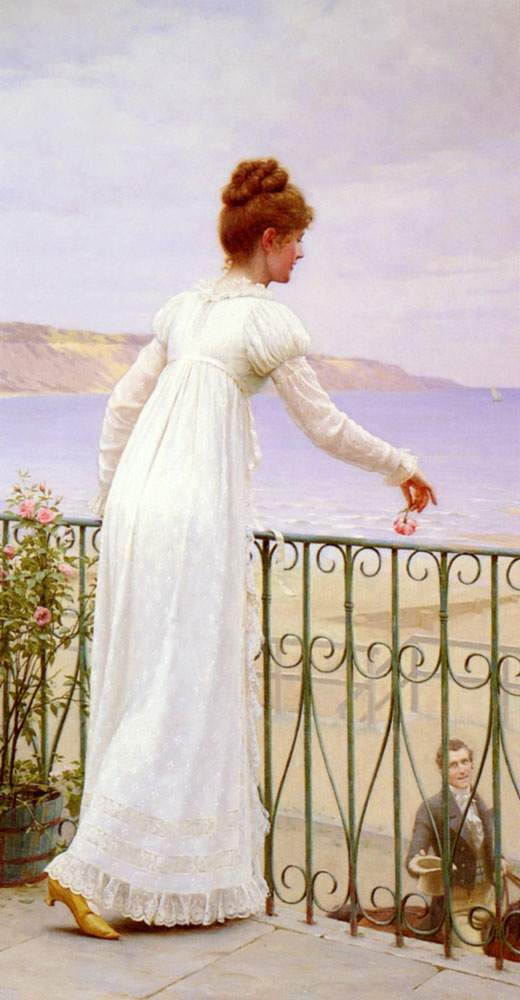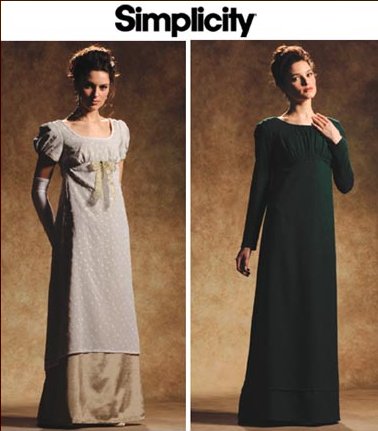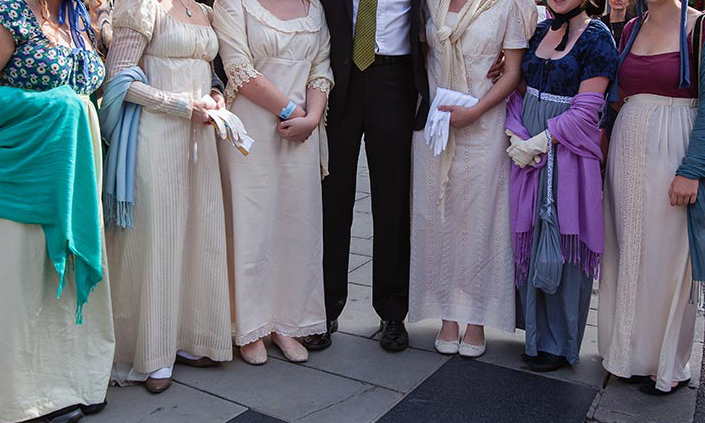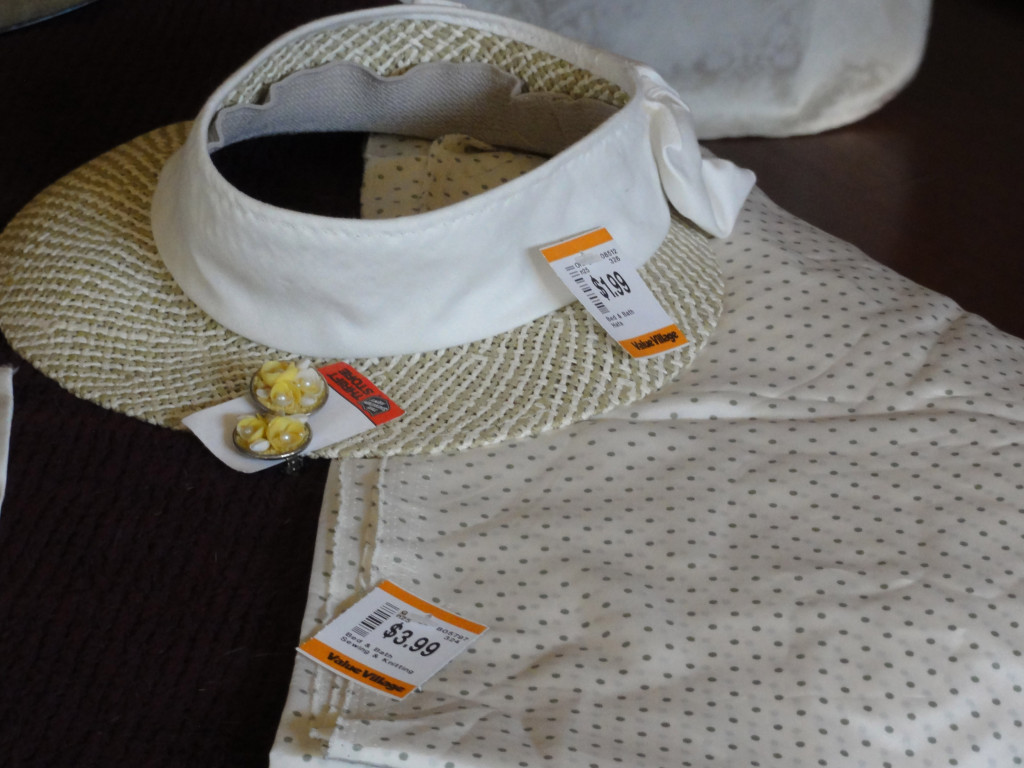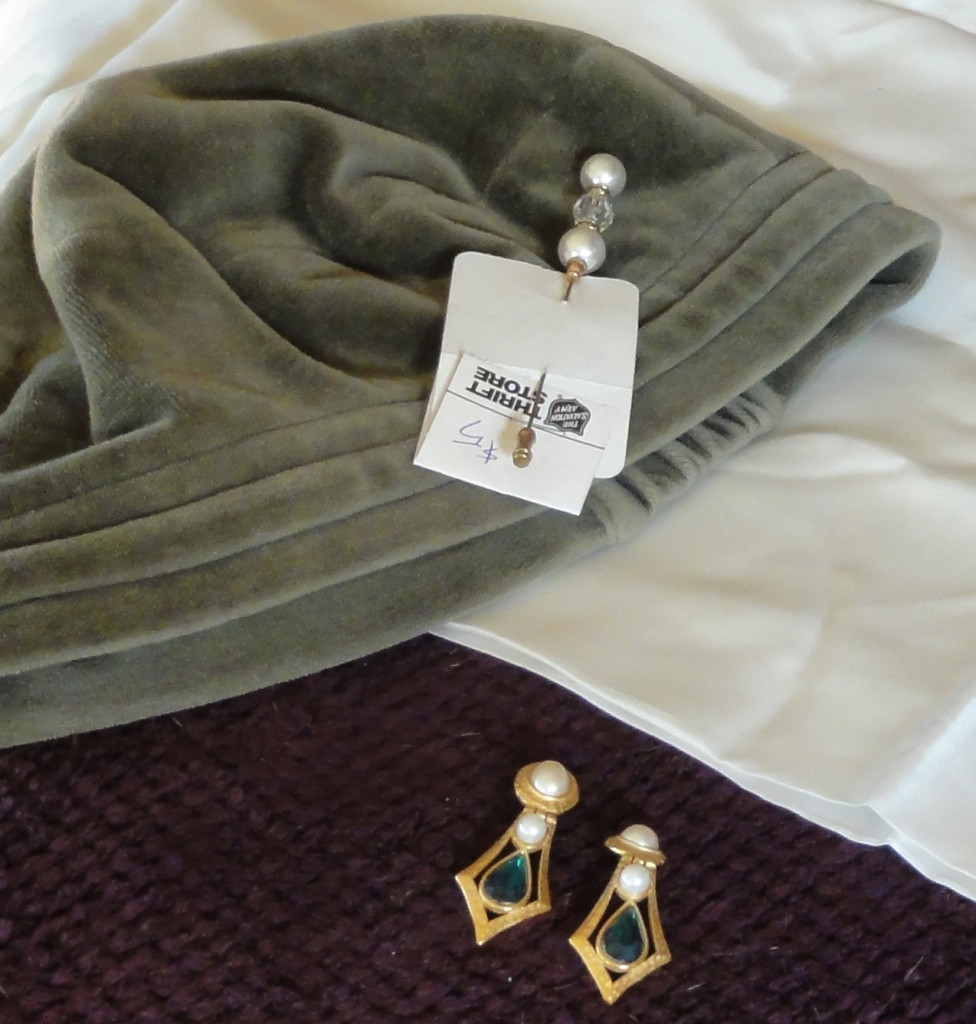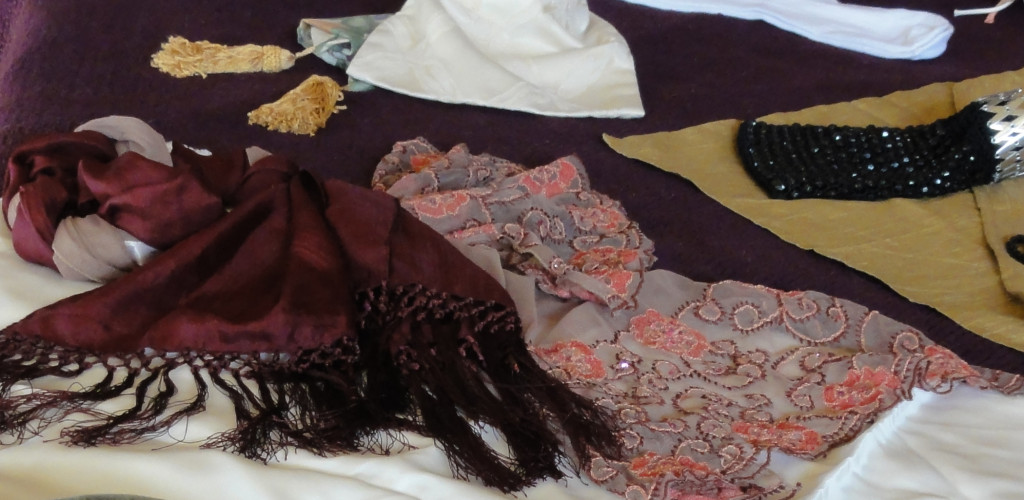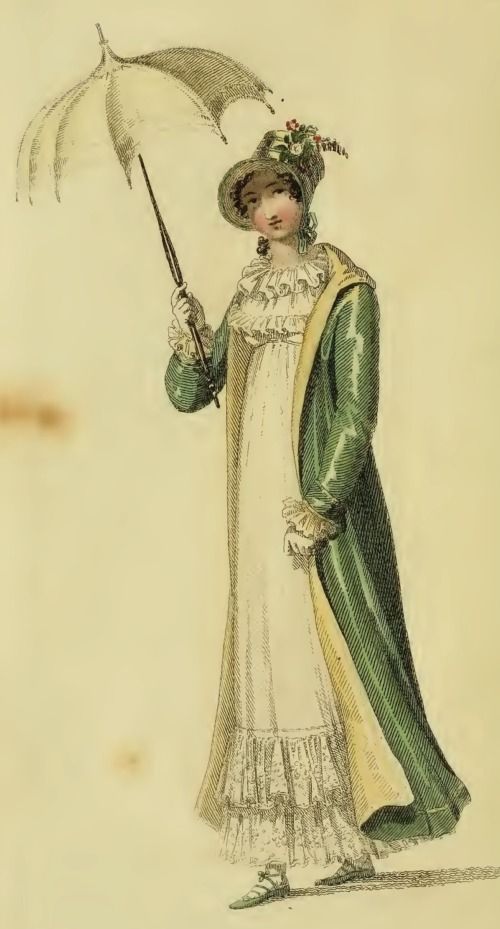The Dear Austen Costume, or, All your Pin Money for a Simple Gown!
by Lady Suzan Rosanna Catron de Lawedre of the Bass
If I could release a long exasperated sigh at the fashion sense of my great-grandniece and goddaughter in respectable company, I fear I would never inhale again, since it occurs all too often. Lime green is her new favourite, second only to a hot, slightly peachy pink.
Miss Suzan Rosanna Lauder, my namesake, does have some redeeming qualities, that being a love for the literature of Miss Jane Austen and the history of Miss Austen’s time. Sometimes I worry she spends too much time chatting with the Meryton Literary Society researchers, but I cannot complain about one achievement this crazy passion brought about: Meryton Press published Suzan’s popular novel Alias Thomas Bennet, a romance/mystery based on Pride and Prejudice. Auntie is proud enough for all the aunties in the universe going back to Miss Austen’s time!
Yet my Suze’s main personal flaw ties in with the history she soaks in: the gowns of the Regency era, which I find so tiresome I cannot speak, fascinate her and she wants nothing less than to see and feel and wear such beauty. Pffftttt!!! This sort of passion should be reserved for the more naturally ladylike Victorian wear, not Regency!
I am told the sellers of reasonable reproductions of these gowns charge at least $300, and less expensive versions are cheap—oh yes, I meant to say it that way—poorly constructed or not authentic. The better products are handmade and fitted for that price, in appropriate fabrics. Then, one must double her dress budget to add the accoutrements of the full Regency costume, like shoes and purse. I am flabbergasted. Couldn’t she have a cheaper hobby, like port tasting? A nice prunes and dry cocoa VSOP and she would forget how high her waistline sits.
For the enlightenment of the intelligent masses familiar with the lovely elaborate styles of the Victorian period, but ignorant of its differences from the beat-of-an-eyelash time period covered by Regency England (1811-1820), I will describe the shortcomings of the Regency period costume.
Those bonnets should not appear in any location except a farm: straw visors with tea cosies perched upon them! The hats are not a great deal better. Some have a chimney in place of said tea cosy, but most are low, shapeless things. Every wearer dons a big feather and a few little berries, but not much else to decorate the hat. Scant trim, narrow brim!
Shapeless becomes a theme in these fashions when we go on to examine the gowns that show the figure of the wearer so well, they may as well be wrapped in my parlour draperies, save the close-fitting bodice. The skirt is so high under the bosom it is impossible to know if the wearer owns a waist, making any attempt at cinching a corset worthless.
And that is no matter, since the corsets are not constructed to cinch the waist, rather, they are merely devices to raise the bosom to extraordinary heights. Some wear short stays for this reason: why care about your waist? My niece lamented she doesn’t quite trust a true Regency corset to hold on to “the girls” and worries they may fall out. Goodness, that expression makes me shudder. But these short stays are barely a brassiere, so I cannot see the fuss compared to a waist cinch.
Day-wear gowns, with long sleeves, high necklines, and pale but tastefully printed or embroidered muslins and percales are tolerable, and do tend to a little lace at various locations, but a great deal more lace would add extra puff to the puffed short sleeve over the plain long sleeve, and maybe some more rows of wider lace about the skirt, and pearled bodice, and… I think you get the picture. But Regency is mostly simple, and particularly day dresses.
At least one has an opportunity to embellish in a state of full dress, which means a great deal less fabric covers one’s bosom, back, and arms. Clothes for a ballroom can be richly coloured and dramatic; typical trims include sheer overlays; larger, contrasting, prettier embroidery; pin-tucks, ruching, or quilling; and additional ribbons or fabric insets on the short, puffed sleeves.
“What about ruffles…?”
I just got the stink-eye from my niece. There had been a lecture before, just when the dessert tray was at the next table: we do not do the over-embellished dresses of the late Regency.
But that’s not right. By 1820, even a few years before, dresses had BIG sleeves and BIG frills and BIG bows and BIG fabric roses and BIG rows of fur trim, and ladies wore BIG hats with BIG stacks of BIG feathers, I remind her.
No reply.
Darn. She’s mad. We know Austen didn’t make it until the end of the Regency (1775-1817), and she’s what counts.
So lace… The only large piece of lace is a tucker for the afternoon, since these necklines plunge so low your beau will have no surprises, especially combined with the extreme push-up of the corset. I sulk.
Shoes! I perk up—there is a place one could enjoy drama! But no, the Regency footwear is simple, and not a great deal different than the ballet flats the young ladies wear these days. Ah, the historical photos come out… I admire the pointy-toed ones with bright colours and embroidery, but Miss Published Author says those were going out of style. Really? In favour of plain flats? Oh, I’m corrected! They are often coloured and decorated, but always have a low heel. A kitten heel up to one inch high is acceptable, but no higher, and it must be a flared kitten heel.
A one inch flared kitten heel? I have a pair! They’re mules, about eight years old. What? Shoes about eight years old are close to Regency styles, and they’re cheap in thrift shops, if not already in the back of your closet. Out comes the can of Lysol.
When she begins to speak of the length of the toe box on the Regency shoe, I pronounce her too knowledgeable.
Ah, the web pages come out to back her up. Metropolitan Museum, Victoria and Albert, McCord Museum, Kyoto Museum: all feature photos of actual Regency clothing, as opposed to supposed reproductions made by individuals or movie costume designers, or grandiose wish-list versions from fashion magazines by Ackermann and friends.
Suzan states, “These are real examples of what was worn in the Regency. Notice the diamond design of the back of the bodice, and how the skirt is gathered there, but is flat in front.”
Hmmmm. Interesting, and perhaps I can concede my draperies are less comparable after all.
We review gowns, reticules (a small drawstring purse), chemises (like a slip), elbow-length kid gloves, thigh-high stockings, and shoes, many with detailed embroidery—even some corsets had a simple white-on white embellishment. Why does no one embroider these days? Numerous handkerchiefs, tea towels, table cloths, pillow cases—that is what my niece and I learned as children. Perhaps I could take it up again…
What? Crotchless pantaloons! No panties? Next, please!
Oh, the bling! The floral themes in multi-coloured jewels, similar to inexpensive costume jewelry in budget fashion shops right now! Astrological signs? Snake rings? I give her a look. She’s not backing down, and appears to believe this hogwash. I suppose Elizabeth Bennet has a tattoo of “Fitz N Liz 4-Ever” in a blood-red heart as well! Please.
The museums have fans and parasols, too, each one striking in the attention to detail necessary to render it so beautiful it creates awe and covetous tendencies for two centuries and more. Besides the real, preserved museum examples, Suze has collected pages of paintings from the period as well.
“I’d love to try on that one,” she says.
I find myself quite involved by now, and it’s clear she wants to dress up. Do we ever get much past childhood? Aunties are best at this game, so my job description for the next while is clear. “Surely we can find items in your closet that would work! “
My niece laughs. A move into a condo from a large house meant that anything not used recently was given away. The silly girl had no gowns, no ribbons or remnants to speak of! She defended herself: in spite of it, she had gathered a few useful items to start a Regency costume.
Not to be held back, I insisted on examining the collection and inserting my own superior ideas. Do you have any silk dinner napkins or scarves? Jeweled brooches or hair barrettes? Silk flowers or leaves to trim the hat? Large clip-on earrings to act like shoe roses? Gem-type costume jewelry? She had completely forgotten she owned short white cotton gloves for hand care.
We created the Regency that day.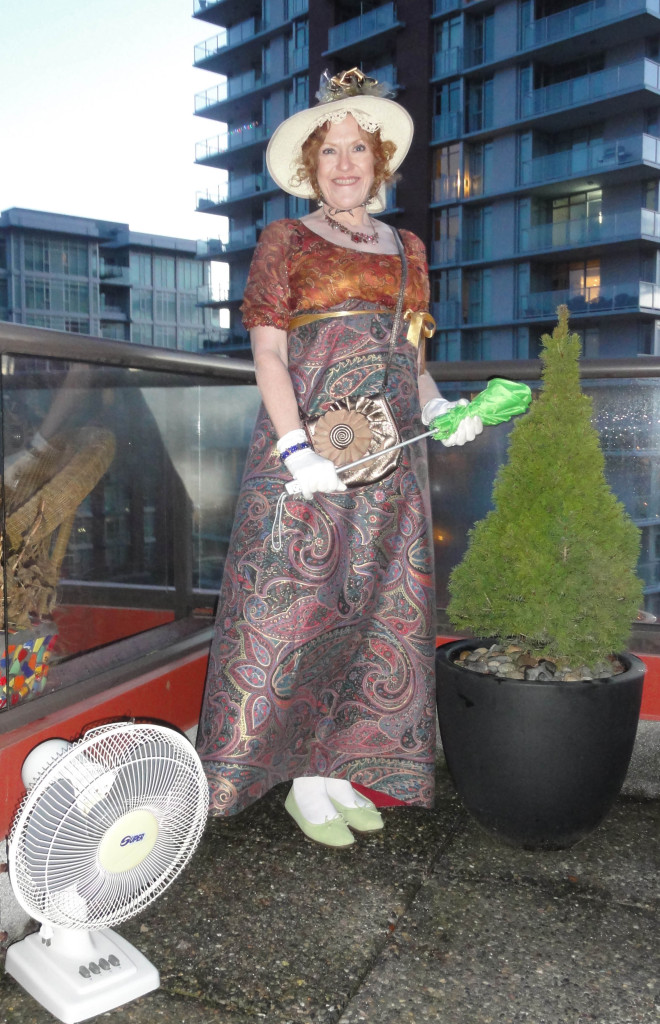
Not a perfect outfit, and certainly not one she’d wear to any Jane Austen event, but enough to add confidence to her longing to dress as if it were another time.
• An empire-waist short silk dress with raglan puffed sleeves, a panel of a 90’s window topper pinned on for the skirt (I did not admit my former comparisons to her, but I did have my own inward laugh), and a short length of satin gift wrap ribbon tied below the bodice (the matching gift bow went on the hat),
• A push-up bra, a full slip tied at the waist to create a longer slip,
• A small purse,
• A roll-up type picture brim hat with an oblong silk scarf turbaned over the opening (I admit it looks more beach than farmer), a little “Birks” ribbon to tie it on, and a gift bow for trim,
• Great-grandma’s tatted doily as a cap under the hat,
• Large faux-emerald and pearl earrings, purple bead bracelet, red-jeweled bronze choker.
• White knee-high stockings,
• Lime green ballet flats,
• Lime green umbrella,
• For silliness, an electric fan!
Suze was pleased. A small amount of money would suffice to purchase more appropriate items, but far less altogether than one custom-made dress by an expert seamstress. She would search for a small, fancy, drawstring purse for a reticule; a better-shaped hat; a Chinatown fan; shoes without the non-Regency holes pattern in them, and decent, longer ribbons and lace!
“Yes, dear, and you sew well, so you can make your own gown.”
“No, I plan to buy a gown and adjust it to suit. Besides, at all the JASNA events, you see photos of 15 women in gowns from the same pattern. I want something unique,” she said. “You know, others who don’t sew at all might be interested in what I’m doing here, and people with a lot less money than I have could afford an outfit, too. Hey, I have an idea!”
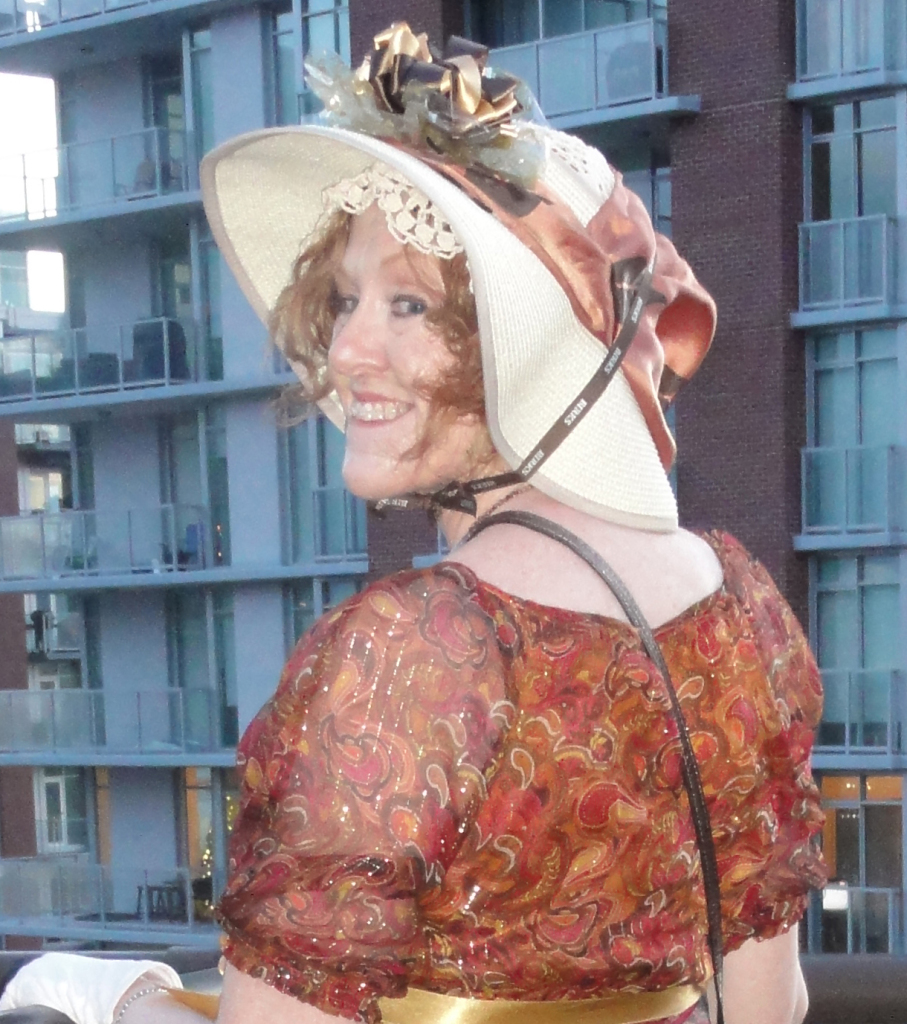 The idea, which I think is utterly corny, to make a unique costume comprised of cost-free and budget items, will be called The Thrift Shop Regency Costume Experiment. She plans to use found items at home, thrift and vintage store purchases, and sale products. Only incidentals can be purchased at regular price. Incidentals? Double-sided tape, safety pins.
The idea, which I think is utterly corny, to make a unique costume comprised of cost-free and budget items, will be called The Thrift Shop Regency Costume Experiment. She plans to use found items at home, thrift and vintage store purchases, and sale products. Only incidentals can be purchased at regular price. Incidentals? Double-sided tape, safety pins.
She continues to plan aloud, and I listen. There’s a goal for full authenticity in appearance, but compromises will have to be made, such as the lack of true kid shoes, and the reality that no one will see the flat plastic bottom of the fully synthetic shoe because the top looks right. In other areas, she hopes she can purchase materials to design projects that are virtually-sewing-free. No hot glue guns, either, since she’s afraid of burns!
Suze is confident she can find items to stand in for most everything, but worries about a rare and prized item: a proper Regency pagoda Parasol.
“Not a Battenburg?”
“No, too Victorian. Rare and minimal lace applies to the parasol just as well as the gown of the Regency.”
“Booooo.”
“Either fine fringe all around, or tassels on the point of each rib serve as the embellishment.” And Suzan adores them.
“Okaaaaay… did I mention Victorian was more… interesting?”
“They aren’t plain! Just as for evening gowns, shoes, stockings, and reticules, they can be almost any colour except black or gray, reserved for mourning.”
“No frou-frou, just loud. I’m glad it works for you.” My smirk and eyeroll weren’t all that well hidden, and she gave me the sneery head shake in return.
She’s checked this one extensively. Inexpensive pagoda Parasols from wedding stores have the wrong design (too many ribs, black piping on the outside of ribs, and a curved handle) and most colours are garish. Used older ones from the 40’s, 50’s, and 60’s have Bakelite handles (hard plastic that can crack with age), and even if their fabric pattern is more staid than some of the psychedelics, they can be $300, even in poor shape.
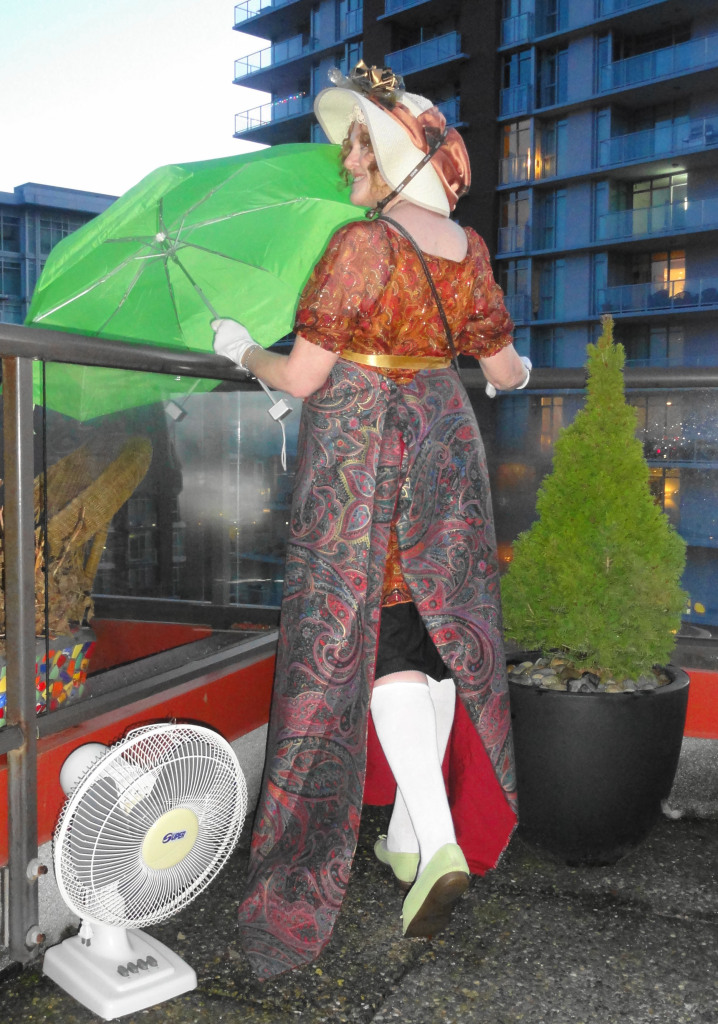 But Suzan’s adamant about this specific article. I discover parasols are tied into a comedic scene in her recently completed Austen-inspired novel, Letter from Ramsgate, as well as a cherished recollection of the bond formed over a joke with an AHA cold reader for Suzan’s Meryton Press published novel, Alias Thomas Bennet. The line is: “Parasols in a ballroom? But of course!” Try to find it in the book. I couldn’t.
But Suzan’s adamant about this specific article. I discover parasols are tied into a comedic scene in her recently completed Austen-inspired novel, Letter from Ramsgate, as well as a cherished recollection of the bond formed over a joke with an AHA cold reader for Suzan’s Meryton Press published novel, Alias Thomas Bennet. The line is: “Parasols in a ballroom? But of course!” Try to find it in the book. I couldn’t.
I, myself, will be off to the side of the room with my hand over my eyes in mortification. Why? She should have picked Victorian. You, however, will be treated to glimpses of the project from time-to-time in her blog, road trips with the redhead, on Meryton Press’s web site. Maybe you’ll be ready for Bath in March, or Louisville in June!
Tsk. You are correct. There is no doubt I will peek. A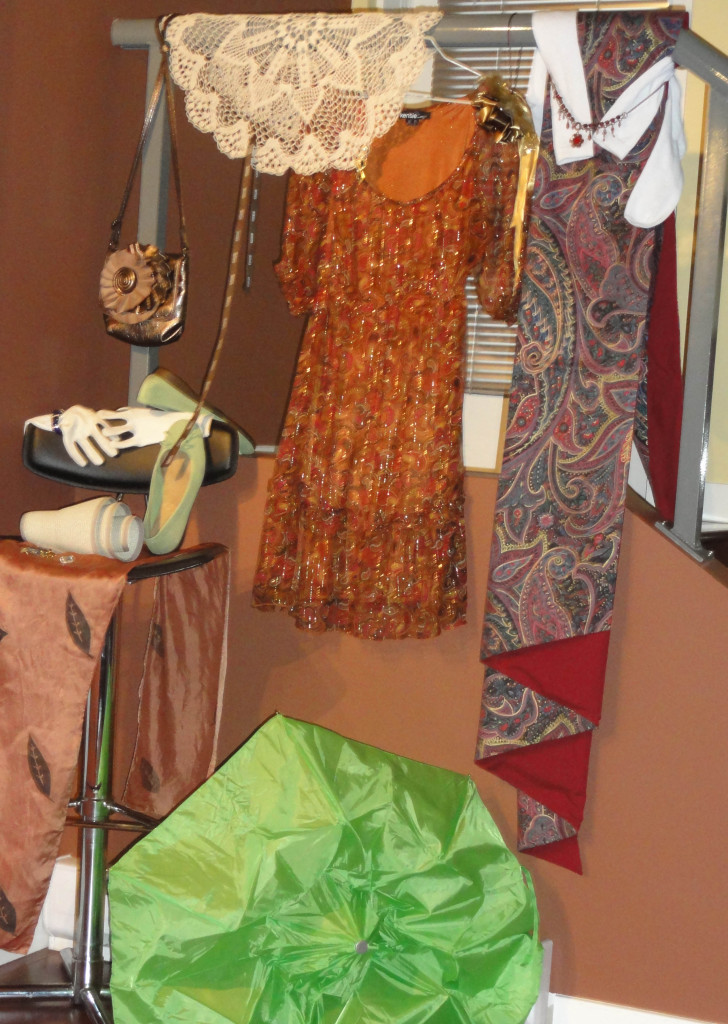 t least when she discusses shoes. Or bling.
t least when she discusses shoes. Or bling.
Like this:
Like Loading...

